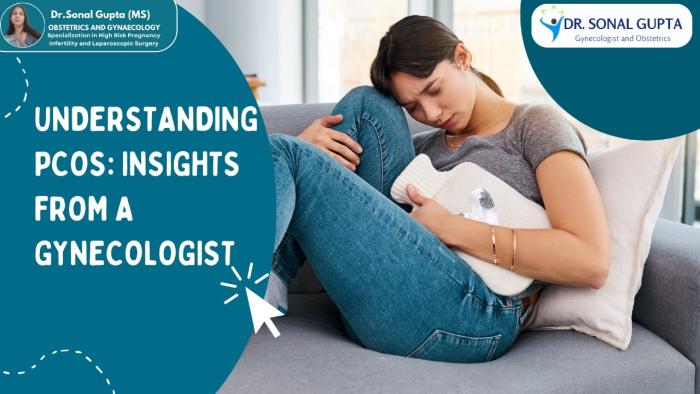- For Appointment: +91 9568139362
- Mon-Sat (10am - 8pm)
- drsonalgupta2@gmail.com
- Login

Jan 02, 2025 Dr Sonal Gupta
Understanding PCOS: Insights from a Gynecologist
Polycystic Ovary Syndrome (PCOS) affects millions of women worldwide. Discover its symptoms, causes, and treatment options to take control of your health.
Polycystic Ovary Syndrome (PCOS) is a prevalent hormonal condition that affects women’s health, often leading to challenges like irregular periods, infertility, and weight gain. Despite its widespread impact, it remains shrouded in misconceptions. This blog offers an in-depth understanding of PCOS, covering its symptoms, underlying causes, associated health risks, and actionable strategies for effective management. Empower yourself with expert insights to navigate PCOS and improve your overall well-being.
Polycystic Ovary Syndrome (PCOS) is a common hormonal disorder affecting 1 in 10 women of reproductive age. Despite its prevalence, the condition is often misunderstood and misdiagnosed, leading to unnecessary distress. This blog provides an in-depth look at PCOS, its symptoms, causes, and effective ways to manage it.
What is PCOS?
PCOS is a hormonal imbalance that occurs when the ovaries produce excessive androgens (male hormones), leading to irregular ovulation and the formation of multiple small cysts on the ovaries. It can affect a woman’s menstrual cycle, fertility, appearance, and overall health.
Common Symptoms of PCOS
-
Irregular Periods: Infrequent, prolonged, or absent menstrual cycles.
-
Excess Hair Growth: Increased facial and body hair (hirsutism), often due to higher androgen levels.
-
Acne: Persistent breakouts, especially on the face, chest, and back.
-
Weight Gain: Difficulty managing weight or unexplained weight gain.
-
Thinning Hair: Hair loss or thinning on the scalp.
-
Darkened Skin Patches: Skin discoloration, often on the neck, armpits, or under the breasts.
Causes of PCOS
The exact cause of PCOS is unknown, but several factors contribute to its development:
-
Insulin Resistance: Elevated insulin levels can lead to increased androgen production.
-
Hormonal Imbalances: Excess androgen production disrupts ovulation.
-
Genetics: A family history of PCOS can increase the risk.
-
Lifestyle Factors: Poor diet, lack of exercise, and stress may exacerbate symptoms.
Health Risks Associated with PCOS
If left untreated, PCOS can lead to complications such as:
-
Infertility
-
Type 2 diabetes
-
Cardiovascular disease
-
Endometrial cancer
-
Sleep apnea
Managing PCOS: Expert Recommendations
-
Lifestyle Modifications:
-
Healthy Diet: Focus on a low-glycemic index diet rich in fruits, vegetables, lean proteins, and whole grains.
-
Regular Exercise: Engage in at least 30 minutes of moderate physical activity most days of the week.
-
Weight Management: Losing even 5-10% of body weight can improve symptoms and hormone levels.
-
-
Medications:
-
Hormonal Birth Control: Regulates menstrual cycles and reduces androgen levels.
-
Metformin: Improves insulin resistance and lowers blood sugar levels.
-
Fertility Treatments: Medications like Clomiphene or Letrozole can stimulate ovulation for women trying to conceive.
-
-
Stress Management:
-
Practice mindfulness, yoga, or other relaxation techniques to reduce cortisol levels, which can worsen symptoms.
-
-
Regular Check-Ups:
-
Work with a gynecologist to monitor symptoms and adjust treatments as needed.
-
Breaking the Myths About PCOS
-
Myth: PCOS only affects overweight women.
Fact: PCOS can affect women of all shapes and sizes, though obesity may worsen symptoms. -
Myth: PCOS is rare.
Fact: It’s one of the most common hormonal disorders among women of reproductive age. -
Myth: PCOS makes pregnancy impossible.
Fact: Many women with PCOS conceive successfully with appropriate treatment and lifestyle changes.
Conclusion
PCOS is a manageable condition, and early intervention can significantly improve quality of life. By adopting a proactive approach and working with a trusted gynecologist, women with PCOS can lead healthy, fulfilling lives. For expert guidance on managing PCOS, consult Dr. Sonal Gupta at Ojas Hospital. Visit https://drsonalgupta.in/index.php to schedule your consultation and take charge of your health today.
